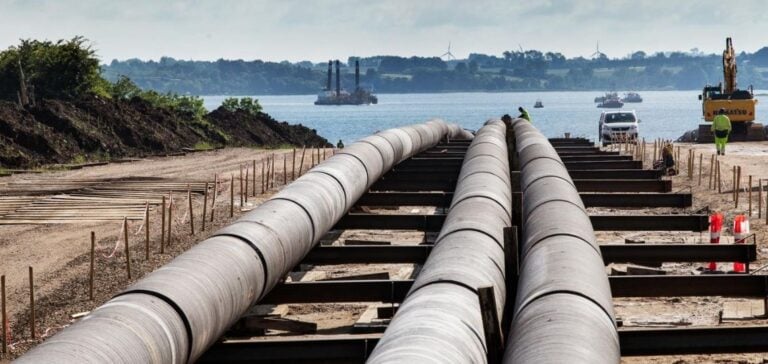Spain’s Enagás and France’s GRTgaz, together with Teréga and OGE (Open Grid Europe), have formalized an agreement to develop the BarMar project, a subsea pipeline linking Barcelona to Marseille. The project, worth an estimated 2.5 billion euros, is part of the H2MED initiative to create a hydrogen transport infrastructure across Europe.
An ambitious European project
BarMar is a key component of the H2MED initiative, which aims to integrate the hydrogen networks of the Iberian Peninsula with those of France and Germany. The main objective is to support the transition to a low-carbon economy by facilitating the transport of renewable hydrogen across Europe. The project was supported by the Spanish, French and Portuguese governments, as well as by the European Commission. Under the terms of the agreement, Enagás will own 50% of the project company, while GRTgaz and Teréga will hold 33.3% and 16.7% respectively. This ownership structure reflects the proportional contributions of the parties in the Spanish and French segments of the pipeline.
Technical Perspectives and Challenges
Setting up the BarMar pipeline represents a significant technical and logistical challenge. Feasibility studies, which are an essential component of the signed agreement, will enable us to assess the conditions required for the final investment decision. These studies will focus on the environmental, technical and economic aspects of the project. The pipeline is also designed to meet the growing demand for hydrogen in Europe, particularly in the industrial basins of Iberia and France. The integration of these networks is crucial to achieving the decarbonization targets set by the European Union for 2030.
Strategic Partnerships
In parallel with the BarMar project, Enagás has strengthened its cooperation with the Portuguese gas network operator REN. Together, they signed a side letter for the development of the CelZa interconnection between Celorico da Beira (Portugal) and Zamora (Spain). This project aims to improve hydrogen network connections between the two countries, strengthening the Iberian Peninsula’s position as a hydrogen hub in Europe. The partnership with OGE, which joined the H2MED project in 2023, underlines the importance of transnational cooperation for the success of this initiative. OGE will contribute its expertise and extensive network in Germany, facilitating the integration of hydrogen markets in Europe.
Economic and environmental impact
The development of the BarMar pipeline and the H2MED initiative in general is expected to have a significant impact on European energy markets. Not only will these projects diversify energy supplies, they will also help reduce greenhouse gas emissions by promoting the use of renewable hydrogen.
The companies involved, such as Enagás, GRTgaz, Teréga and REN, are demonstrating their commitment to the energy transition and to reducing their carbon footprint. Enagás, for example, aims to become carbon neutral by 2040, while GRTgaz and Teréga are investing heavily in sustainable energy solutions.
The agreement between Spain and France for the BarMar hydrogen pipeline represents a major step forward in the development of renewable energy infrastructures in Europe. By linking the hydrogen networks of the Iberian Peninsula with those of France and Germany, the H2MED project is a key pillar of Europe’s energy transition. This strategic partnership between Enagás, GRTgaz, Teréga, REN and OGE underlines the importance of transnational cooperation in achieving Europe’s decarbonization objectives.






















